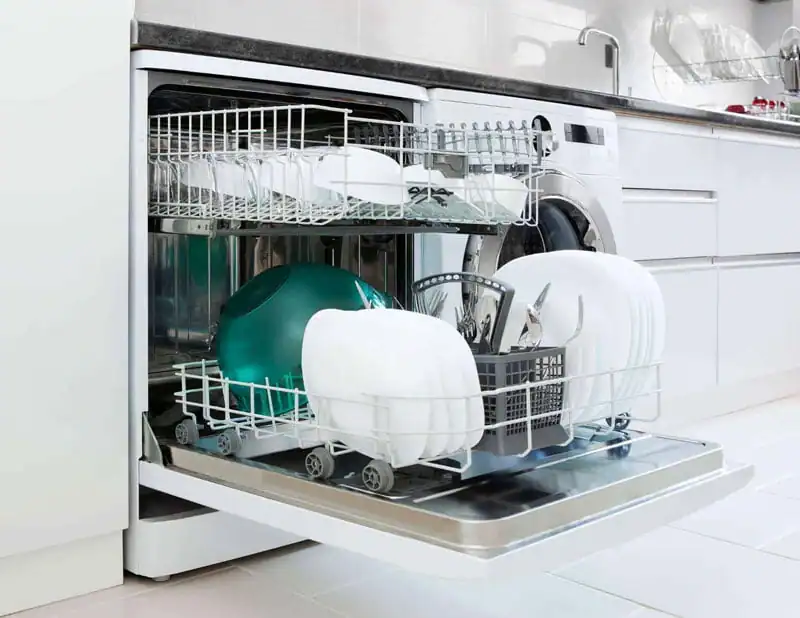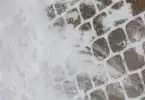Many people have heard that you can use other salts, such as Pool salt in a dishwasher as a substitute for regular dishwasher salt. This is because any salt made of the same chemical compound, sodium chloride, seem like a reasonable exchange. In this article we look at the similarities and the differences between dishwasher salt and other options, such as Pool salt or Water Softener salt.
What is Dishwasher Salt?
Dishwasher salt is a type of water softener salt that helps to remove hard water minerals, such as calcium and magnesium, from the water used in dishwashers.
It does this through an ion-exchange process, where the resin balls in the salt compartment of the dishwasher attract the hard water minerals and replace them with sodium ions. This process helps to prevent the buildup of limescale in the dishwasher and on dishes, which can cause cloudy glass and stains.
It is important to point out that this only works with dishwashers that are equipped with their own water softening system. United States brands do not tend to have these systems. Two European brands that I know of that have a water softening system available (and built right into the dishwasher) are Miele and Bosch. Also, not all dishwashers from these companies have the water softening feature. I have a fairly high-end Bosch dishwasher model (terrific machine, BTW) but it does not have water softening built in.
Why Use Dishwasher Salt?
Dishwasher manufacturers offer a water softener system option for people who have very hard water, but that do not have (or don’t want to have) a whole house water softening system. Having softened water means that you will have fewer spots on your dishes and glassware. It also means that you can use less detergent in every load.
How Do I Know My Dishwasher Uses Salt?
Maybe you moved into a pre-owned home or a pre-occupied rental. If you have a Miele or Bosch dishwasher, how would you know that it needs salt? Often the original owner’s manuals don’t seem to be available and the appliance model number can be hard to find so you can’t look it up online.
The main way that you know is that the dishwasher will have a separate compartment that is marked ‘Salt’. It will be a different compartment than the one used for dishwasher detergent and also different from a ‘Rinse Aid’ dispenser. You might also get an error message from the machine if the salt is low.
Can I Use Dishwasher Salt if I Don’t Have a Water Softening Dishwasher?
Well, you could, but it wouldn’t do anything. You’d have salty water, but the salt would not soften your water or keep spots off of your dishes.
To learn more about how water softening systems work, and how salt is used in that process, see our article: Water Softener Salt: Its Effects on Pipe Corrosion. Within this article we go into detail about how soft water not only reduces detergent use and prevents spotting, it also can prevent scale from building up inside of appliances like dishwashers. Also see a very good article provided by Penn State University on Water Softening that can tell you more about the softening process.
Using dishwasher salt can help to save you money in the long run by reducing the amount of detergent and rinse aid needed to clean your dishes. The initial purchase of the water softening option on the dishwasher however, may offset that savings.
Why Don’t US Dishwashers Have Water Softening Systems?
While I can’t give a definitive reason why we don’t seem to have US made dishwashers that offer water softening systems that use dishwasher salt, I suspect that it comes down to one or more of these reasons:
- Adding a water softening system Increases the Initial Cost of the appliance
- Adding a water softening system might Increase the Maintenance of the appliance – an example would be needing to replace the resin bed
- US Manufacturers have decided to Use Rinse Aid products Instead
Have you ever thought about what Rinse Aid products are and how they work? Basically, they are a food safe additive that improves ‘sheeting action’ which means that the water on your wet glassware tends to fall off of or sheet more easily. If there isn’t as much water on the glass, it dries faster and leaves fewer spots. Rinse aid products contain a blend of surfactants, salts (like potassium sorbate), and acids (often citric acid).

Alternatives to Dishwasher Salt
Since you are still reading, you must have a dishwasher that uses salt ;)
You’ve probably learned that specialized dishwasher salt, especially the brand name stuff is fairly pricey. At the time of writing this article, it was over $4 per pound. So are there good alternatives?
Table Salt
One substitute for dishwasher salt is regular table salt. While it’s not as effective as dishwasher salt, it can help to soften the water and prevent limescale buildup. Table salt can contain anti-caking agents and often is supplemented with Iodine. These additives could potentially interfere with the water softener system’s resin bed over time. If you are going to try table salt, try to use the highest purity salt that you can find – the closer to 99.9% pure sodium chloride, the better.
Sea Salt
Much like table salt, Sea salt could be substituted for dishwasher salt. While sea salts don’t tend to have Iodine supplementation, they can contain other minerals (some of which are the same minerals that cause hard water, like magnesium) and they can contain anti-caking additives. Sea salt also tends to be more expensive, so you might not be saving any money over Dishwasher salt. Maybe in a pinch … (pun intended).
Pool Salt
Pool salt also can contain some additives, even in fairly high purity salt – pool salt tends to run around 99.4% pure. The additives are different though: they tend to be pH buffers and alkalinity increasers, and these things may affect your water softener resin bed over time. Also, not all pool salt is certified as ‘food grade’, so of all the salts in this list, it is the one I would be least likely to recommend.
Water Softener Salt
Water Softener Salt is designed for water softening systems. It is safe for resin beds. I’d have to say that it makes a really good substitute for dishwasher salt. Also, at the time of writing this article, it is available at less than $0.25 per pound (as compared to over $4 / pound). We have an entire article that examines the different types of water softener salt available at A Guide To Water Softener Salt: Pellets, Blocks, Cubes or Crystals. If your branded dishwasher salt comes in a crystal form, pick the water softener salt crystals. If it is pressed into little discs, choose the Pellet form of water softener salt as a close substitute.
Caveats of Substitutes for Dishwasher Salt
It’s important to note that using alternative salt as a substitute for dishwasher salt may not be suitable for all types of dishwashers. It may not work quite as well, and you should also check your dishwasher warranty to see if using dishwasher salt alternatives could possible void the warranty.







